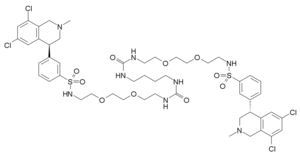
Ardelyx, Inc. announced that the U.S. Food and Drug Administration has approved Ibsrela (tenapanor), a 50 mg, twice daily oral pill for the treatment of irritable bowel syndrome with constipation (IBS-C) in adults. Ibsrela is a minimally-absorbed small molecule that acts locally in the gastrointestinal (GI) tract to inhibit the sodium-hydrogen exchanger NHE3, resulting in an increase in bowel movements and a decrease in abdominal pain for IBS-C patients.
"Ibsrela has the potential to provide IBS-C patients and their doctors with a novel mechanism and an innovative approach to managing IBS-C, a highly burdensome and difficult-to-treat condition affecting more than 11 million people in the United States," commented Mike Raab, president and chief executive officer of Ardelyx. "This approval is an extremely important and rewarding milestone for Ardelyx, and represents the culmination of years of dedication to advancing our discoveries and medicines in an effective and rigorous manner. We look forward to establishing a commercial collaboration with a partner that has the capabilities to drive the successful launch and marketing of Ibsrela in this large and underserved IBS-C patient population."
Mr. Raab continued, "With the approval of Ibsrela for IBS-C, along with the successful completion of our AMPLIFY trial in hyperphosphatemia, we've delivered on two major corporate milestones in the last two weeks due to flawless execution by the remarkable and talented team at Ardelyx. With these milestones accomplished, and the PHREEDOM trial reading out in Q4, I have great confidence that we are well positioned to file our NDA for hyperphosphatemia next year with potential approval and launch in 2021. We are excited about this next chapter for Ardelyx as we begin the development of our playbook for launch and commercialization of tenapanor for hyperphosphatemia in chronic kidney disease patients on dialysis and are excited to begin sharing more of our vision in the coming months."
Ibsrela (tenapanor) Phase 3 IBS-C Program
Phase 3 Study Designs
The Phase 3 IBS-C program included two randomized, double-blind, placebo-controlled trials. The trial designs were identical through the first 12 weeks of treatment, and thereafter differed in that Trial 1 (NCT02686138) continued for an additional 14 weeks of treatment (26 weeks double-blind treatment), whereas Trial 2 (NCT02621892) included a 4-week randomized withdrawal (RW) period (12 weeks double-blind treatment). Patients who were enrolled in these trials met the Rome III criteria for IBS-C, related to abdominal pain and bowel movement frequency.

No comments:
Post a Comment